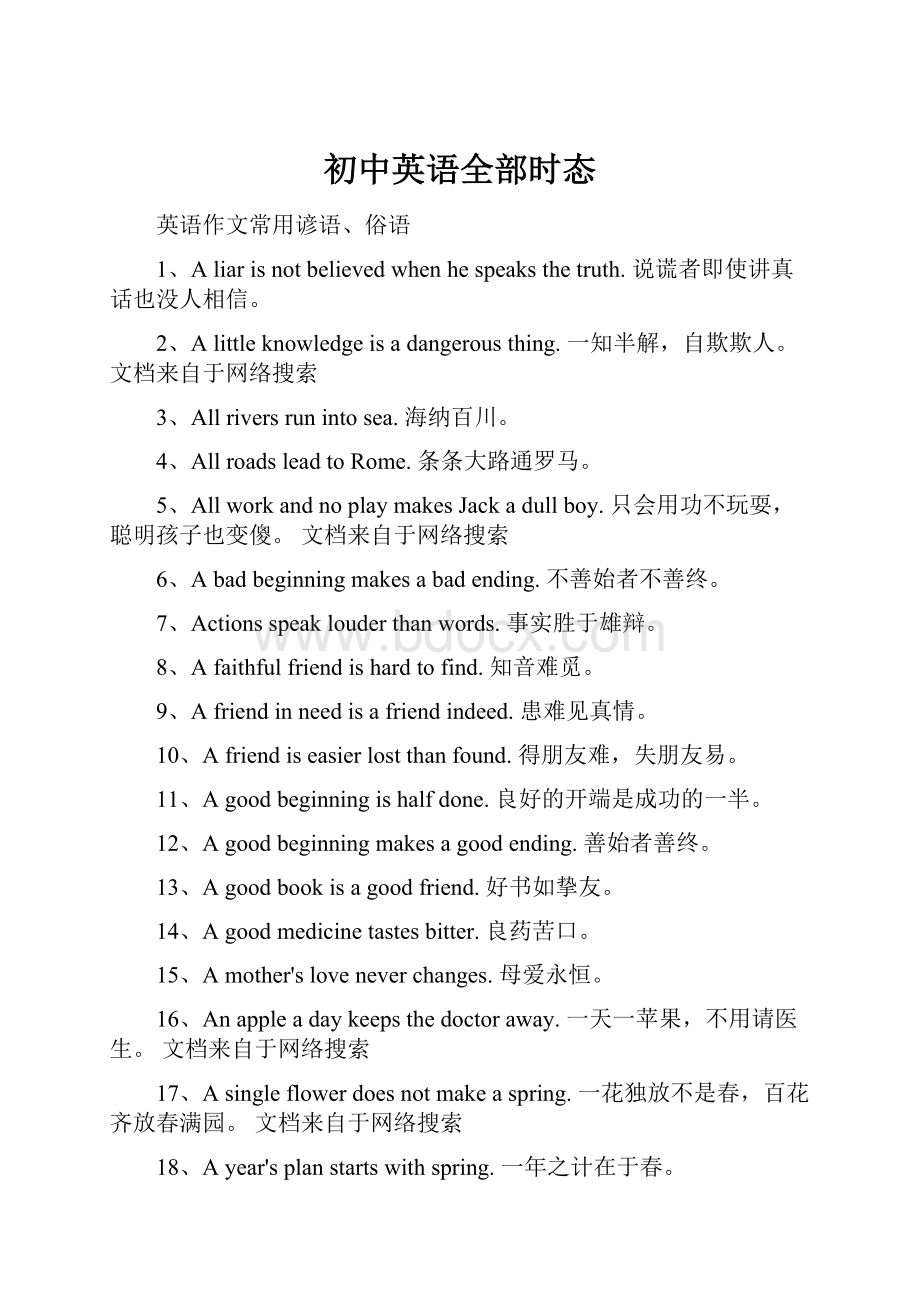初中英语全部时态.docx
《初中英语全部时态.docx》由会员分享,可在线阅读,更多相关《初中英语全部时态.docx(35页珍藏版)》请在冰豆网上搜索。

初中英语全部时态
英语作文常用谚语、俗语
1、Aliarisnotbelievedwhenhespeaksthetruth.说谎者即使讲真话也没人相信。
2、Alittleknowledgeisadangerousthing.一知半解,自欺欺人。
文档来自于网络搜索
3、Allriversrunintosea.海纳百川。
4、AllroadsleadtoRome.条条大路通罗马。
5、AllworkandnoplaymakesJackadullboy.只会用功不玩耍,聪明孩子也变傻。
文档来自于网络搜索
6、Abadbeginningmakesabadending.不善始者不善终。
7、Actionsspeaklouderthanwords.事实胜于雄辩。
8、Afaithfulfriendishardtofind.知音难觅。
9、Afriendinneedisafriendindeed.患难见真情。
10、Afriendiseasierlostthanfound.得朋友难,失朋友易。
11、Agoodbeginningishalfdone.良好的开端是成功的一半。
12、Agoodbeginningmakesagoodending.善始者善终。
13、Agoodbookisagoodfriend.好书如挚友。
14、Agoodmedicinetastesbitter.良药苦口。
15、Amother'sloveneverchanges.母爱永恒。
16、Anappleadaykeepsthedoctoraway.一天一苹果,不用请医生。
文档来自于网络搜索
17、Asingleflowerdoesnotmakeaspring.一花独放不是春,百花齐放春满园。
文档来自于网络搜索
18、Ayear'splanstartswithspring.一年之计在于春。
19、Ayoungidler,anoldbeggar.少壮不努力,老大徒伤悲。
20、Betterlatethannever.不怕慢,单怕站。
21、Byreadingweenrichthemind.读书使人充实,
22、Careanddiligencebringluck.谨慎和勤奋才能抓住机遇。
23、Confidenceinyourselfisthefirststepontheroadtosuccess.自信是走向成功的第一步。
文档来自于网络搜索
24、Customisasecondnature.习惯是后天养成的。
25、Custommakesallthingseasy.有个好习惯,事事皆不难。
26、Doingisbetterthansaying.与其挂在嘴上,不如落实在行动上。
27、Donothingbyhalves.凡事不可半途而废。
28、Don'tputofftilltomorrowwhatshouldbedonetoday.今日事,今日毕。
文档来自于网络搜索
29、Don'ttroubletroubleuntiltroubletroublesyou.不要自找麻烦。
文档来自于网络搜索
30、Earlytobedandearlytorisemakesamanhealthy,wealthyandwise.早睡早起身体好。
文档来自于网络搜索
31、Easiersaidthandone.说得容易,做得难。
32、Easycome,easygo.来也匆匆,去也匆匆。
33、Eattolive,butnotlivetoeat.人吃饭是为了活着,但活着不是为了吃饭。
文档来自于网络搜索
34、Everymanhashisfaults.金无足赤,人无完人。
35、Everymanisthearchitectofhisownfortune.自己的命运自己掌握。
文档来自于网络搜索
36、Everyminutecounts.分秒必争。
37、Eachcoinhastwosides.
38、Factspeaklouderthanwords.事实胜于雄辩。
39、Failureisthemotherofsuccess.失败是成功之母。
40、Godhelpsthosewhohelpthemselves.自助者天助。
41、Healthisbetterthanwealth.健康胜过财富。
42、Honestyisthebestpolicy.做人诚信为本。
43、Hopeforthebest,butpreparefortheworst.抱最好的愿望,做最坏的打算。
文档来自于网络搜索
44、Itisnevertoooldtolearn.活到老,学到老。
45、Knowledgeispower.知识就是力量
46、Likemother,likedaughter.有其母必有其女。
47、Nopain,nogain.(不劳无获。
)
48、Youneverknowtillyouhavetried.不尝试,不知晓。
。
49、Anidleyouth,aneedyage.少壮不努力,老大徒伤悲。
50、Diligenceisthemotherofsuccess.勤奋是成功之母。
51、Earlytobed,earlytorise,makesamanhealthy,wealthyandwise.早睡早起,使人健康、富裕和聪颖。
文档来自于网络搜索
52、Experienceisthebestteacher.经验是最好的教师。
53、Nothingintheworldisdifficultifyousetyourmindtoit.世上无难事,只怕有心人。
文档来自于网络搜索
54、Wherethere'sawill,there'saway.有志者事竟成。
55、Practicemakesperfect.(熟能生巧。
)
56、Pridegoesbeforeafall.(骄傲必败。
)
SuperstarandI
It’scommonthatmanystudentsarecrazyaboutthosesingersandactors.However,liyundi,apianist,isthesuperstarinmyheart.Heisamanoffewwordsandheevenlookslikethegreatestpianist—Chopin.Whenlisteningtohismusic,Icangetridofeverythingnoisyaround.What’smore,Icanfeelhisstrongloveformusic.Romewasn’tbuiltinoneday.Heachievedthegreatsuccessthroughhugeeffort.Icanlearnfromhimthatweshouldnevergiveuptorealizeourdreams.文档来自于网络搜索
SuperstarandI
Hernamefirstappearedasajokethenlikeawonder.SheisSusanBoyle,thesuperstarinmyheart.Althoughshe’snotbeautiful,hervoiceandspiritmovedalltheaudience,includingme.Thesong’Idreamedadream’thatshesangtouchedeveryone’sheartwhohadadreamandwantedtorealizeit.Shetaughtmehowtogoonmydreamsaswellasnevertogiveup.Sheislikeasunshinethatgivesmehope.Wherethereisawill,thereisaway.文档来自于网络搜索
初中英语全部时态
一般现在时
A:
一般现在时通常表示目前阶段经常发生的动作或存在的状态。
结构:
1)be动词的第一人称单数为,第三人称单数为,其他人称为。
有一顺口溜体现了它的用法:
我用am,你用are,is用于他,她,它,单数is,复数are.文档来自于网络搜索
肯定式:
主语+am/is/are+其他
否定式:
主语+am/is/are+not+其他
疑问式:
Am/Is/Are+主语+其他?
简略回答:
(肯)Yes,主语+am/is/are
(否)No,主语+am/is/arenot
缩写形式:
I'm==IamThat's==ThatisWe're==WeareWhat's==Whatis文档来自于网络搜索
You're==YouareWho's==WhoisThey're==TheyareWhere's==Whereis文档来自于网络搜索
He's==HeisShe's==SheisIt's==Itis文档来自于网络搜索
isn't==isnotaren't==arenot
2)行为动词(实义动词)除主语是第三人称单数外,都用动词原形,主语是第三人称单数时,在动词词尾加-s或-es。
文档来自于网络搜索
“动词第三人称单数”的加法即“如何从动词原形变为第三人称单数”
1、一般情况加s.2、以o,s,x,ch,sh结尾加es.3、以“辅音字母+y”结尾改y为i+es文档来自于网络搜索
写出下列动词的第三人称单数:
studyplaygocomehelpteachlielistenbeginopensitthrowwash文档来自于网络搜索
guesscutrunrelaxbeateat文档来自于网络搜索
肯定式:
主语+动词原形/动词的第三人称单数
否定式:
主语+助动词don't/doesn't+动词原形+其他
疑问式:
Do/Does+主语+动词原形+其他
简略回答:
(肯)Yes,主语+do/does(否)No,主语+do/doesnot
缩写形式:
don't==donotdoesn't==doesnot
注意:
have的第三人称单数为has
用法:
1.表示事实,现状,性质或经常的,习惯的动作,常与often,usually,always,sometimes,today,everyday,onceaweek,everyfiveminutes,onSundays等时间状语连用,文档来自于网络搜索
eg.Hehasabrother.
2.表示普遍真理.eg.Theearthgoesroundthesun.
3.表示在现在时间里所发生的一个动作.
eg.Herecomesthetrain.
4.在时间和条件状语从句中代表一般将来时.
eg.I'llgowithyouifyouarefreetomorrow.
一般过去时
一般过去时棗表示过去发生的动作或存在的状态,一般过去时通常由动词的过去式表示。
结构:
1.动词的第一、三有称单数用,其他人称用,其肯定式,否定式,疑问式和简略回答形式与一般现在时相似。
2.行为动词的过去式分为规则和不规则两种,规则动词的过去式是在动词后加或,不规则动词参照不规则动词表,需要专门记忆。
文档来自于网络搜索
肯定式:
主语+动词的过去式+其他eg.Igotupatsixthismorning.文档来自于网络搜索
否定式:
主语+didnot+动词原形+其他eg.Johndidn'tliveherelastyear.文档来自于网络搜索
疑问式:
Did+主语+动词原形+其他eg.Didyouseehimamomentago?
文档来自于网络搜索
简略回答.(肯)Yes,主语+did(否)No,主语+didn't.
用法:
1.主要用于过去某个时间发生的动作或状态.
eg.Myfatherwasatworkyesterday.
2.表示过去经常或反复发生的动作,常与often,always等表示频度的时间状语连用.
eg.Healwayswenttoworkbybuslastsummer.
3.和when等连词引导的状语从句连用.
eg.Whenshereachedhome,shehadashortrest.
4.常与表示过去的时间状语,如…ago,yesterday,lastweek,intheolddays,whenIwasfiveyearsold,in1995等连用.文档来自于网络搜索
eg.Theybegantheworktwomonthsago.
Wereyoubornin1981?
Yes,Iwas.
不规则中寻"规则"
英语中很多动词的过去式是不规则的,有些同学死记硬背,却效果不佳。
我们不妨共同寻找一些不规则动词中的“规则”,这样记忆起来就会事半功倍了。
文档来自于网络搜索
I.过去式与动词原形同形。
例如:
let—let,put—put,hit—hit,read—read[red]等。
II.动词原形以ow/aw结尾,过去式常变为ew。
例如:
know—knew,grow—grew,throw—threw,draw—drew等。
但是也有一些例外,例如:
show—showed。
文档来自于网络搜索
III.许多动词只要将动词原形中的元音字母i改为a,就可变为过去式。
例如:
begin—began,give—gave,sing—sang,swim—swam,sit—sat,drink—drank,ring—rang等。
文档来自于网络搜索
但是win—won例外。
IV.有些动词的过去式以o(a)ught结尾。
例如:
bring—brought,buy—bought,think—thought,catch—caught,teach—taught等。
文档来自于网络搜索
[注意]上述动词过去式究竟是以ought[:
t]还是aught[:
t]结尾,只要记住“有a则a,无a则o”即可。
即:
原形中有a的,过去式变为aught,否则为ought。
文档来自于网络搜索
V.以eep结尾的动词,常将eep改为ept构成过去式。
例如:
keep—kept,sleep—slept,sweep—swept等。
文档来自于网络搜索
一般将来时
一般将来时棗表示将来发生的动作或存在的状态
结构:
助动词shall/will{be(is,am,are)goingto}+动词原形(当主语第一人称时,一般用shall,当主语为第三人称时,用will,但主语为第一人称时,也用will)文档来自于网络搜索
肯定式:
主语+shall/will+动词原形+其他
否定式:
主语+shall/will+not+动词原形+其他.
疑问式:
Shall/Will+主语+动词原形+其他
简略回答:
(肯)Yes,主语+shall/will.(否)No,主语+shall/will+not…文档来自于网络搜索
缩写形式:
'll==shall/willshan't==shallnotwon't==willnot文档来自于网络搜索
用法:
1.表示将要发生的动作或情况,常用时间状语有:
later(on),soon,inamonth,nexttime,fromnowon,tomorrow等.文档来自于网络搜索
eg.Ishallbeeighteenyearsoldnextyear.
MaybeChina'spopulation_______(pass)1,300,000,000bytheyear2005.文档来自于网络搜索
2.表示某种必然的趋势
eg.Fishwilldiewithoutwater.
解析:
1.在以第一人称为主语的问句中,常用shall表示提议和询问情况,在以第二人称作主语的问句中,用will表示请求.文档来自于网络搜索
eg.Whereshallwehavethemeeting?
Willyoupleaselendmeyourpen?
2.当主语是第一人称时,用will表示意愿.决心.允诺.命令等.
eg.IwillgiveyouanEnglish--Chinesedictionaryforyourbirthday.文档来自于网络搜索
3.在时间或条件状语从句中,一般用一般现在时代替一般将来时.
eg.Tomwillwritetomewhenhegetsthere.
4.begoingto+动词原形也可表示将来时.
(1).表示主观意愿.打算等.
eg.He'sgoingtolearnEnglishnextterm.
(2).根据已有迹象,可能要发生的情况
eg.Lookattheblackclouds!
----Itisgoingtorain.
现在进行时
现在进行时棗表示目前或目前阶段正在进行的动作。
(表示“……正在(在)干……”)
结构:
is/am/are+动词的-ing形式(动词的现在分词)
用法:
1.表示目前发生(进行)的动作(不指状态),常用时间状语有:
now,atthemoment等,并常出现在祈使句的句子中,与look,listen连用.文档来自于网络搜索
eg.Areyouwritingalettertoyourfatheratthemoment?
文档来自于网络搜索
Listen!
Sheissinginginthenextroom.
2.表示目前阶段正在进行,而此刻不一定在进行的动作.
eg.Theyareplantingtreesthesedays.
3.表示按计划或安排即将进行的动作,表示这种动作的动词有:
come,go,leave,arrive,start,see等,并常与表示将来时间的状语连用.文档来自于网络搜索
eg.TheyareleavingforAustraliatomorrowafternoon.文档来自于网络搜索
注意:
某些表示感觉或状态的动词,如love,like,prefer,hate,see,know等一般不用现在进行时.文档来自于网络搜索
eg.Lucyprefersarttoscience.
练习题:
(选择填空)
一.般现在时.
()1.MyEnglishteacheraboutthirtyyearsold,butheyoungerthanhereallyis.文档来自于网络搜索
A.is,lookB.is,looksC.am,look文档来自于网络搜索
()2.Jimveryhard,buthetillalittleweakinChinese.文档来自于网络搜索
A.studies,isB.study,isC.doesn’tstudy,is文档来自于网络搜索
()3.Weallknowthatthesunroundtheearth.文档来自于网络搜索
A.goesB.don’tgoC.doesn’tgo文档来自于网络搜索
()4.TheretwelvemonthsinayearandJanuaryfirst.文档来自于网络搜索
A.is,comesB.are,comeC.are,comes文档来自于网络搜索
()5.Whothekitebestofall,Jim.LucyorLily?
文档来自于网络搜索
A.fliesB.flyC.areflying文档来自于网络搜索
()6.theGreatWalloneoftheplacesofgreatinterestsinChina?
A.WasB.DoC.Is文档来自于网络搜索
()7.youusuallytoschoolwithclassmates?
文档来自于网络搜索
A.Do,comesB.does,comeC.Do,come文档来自于网络搜索
()8.shehomeatsixo’clockeverymornig?
文档来自于网络搜索
A.Do,comesB.Does.ComeC.Do,come文档来自于网络搜索
()9.MymotherlikewatcingTV,soshetobedveryearlyeveryevening.文档来自于网络搜索
A.doesn’t,goB.don’tgoC.doesn’tgoes文档来自于网络搜索
()10.MrGreenusuallynewspapersaftersuppereveryday.文档来自于网络搜索
A.readB.readingC.reads文档来自于网络搜索
二.一般过去式.
()1.Thetwointhesameclasslastyear.文档来自于网络搜索
A.areB.wasC.were文档来自于网络搜索
()2.---Whereyou?
文档来自于网络搜索
----Iwenttobuysomefoodforsupper.
()3.ThestudentsinLiLei’sclas